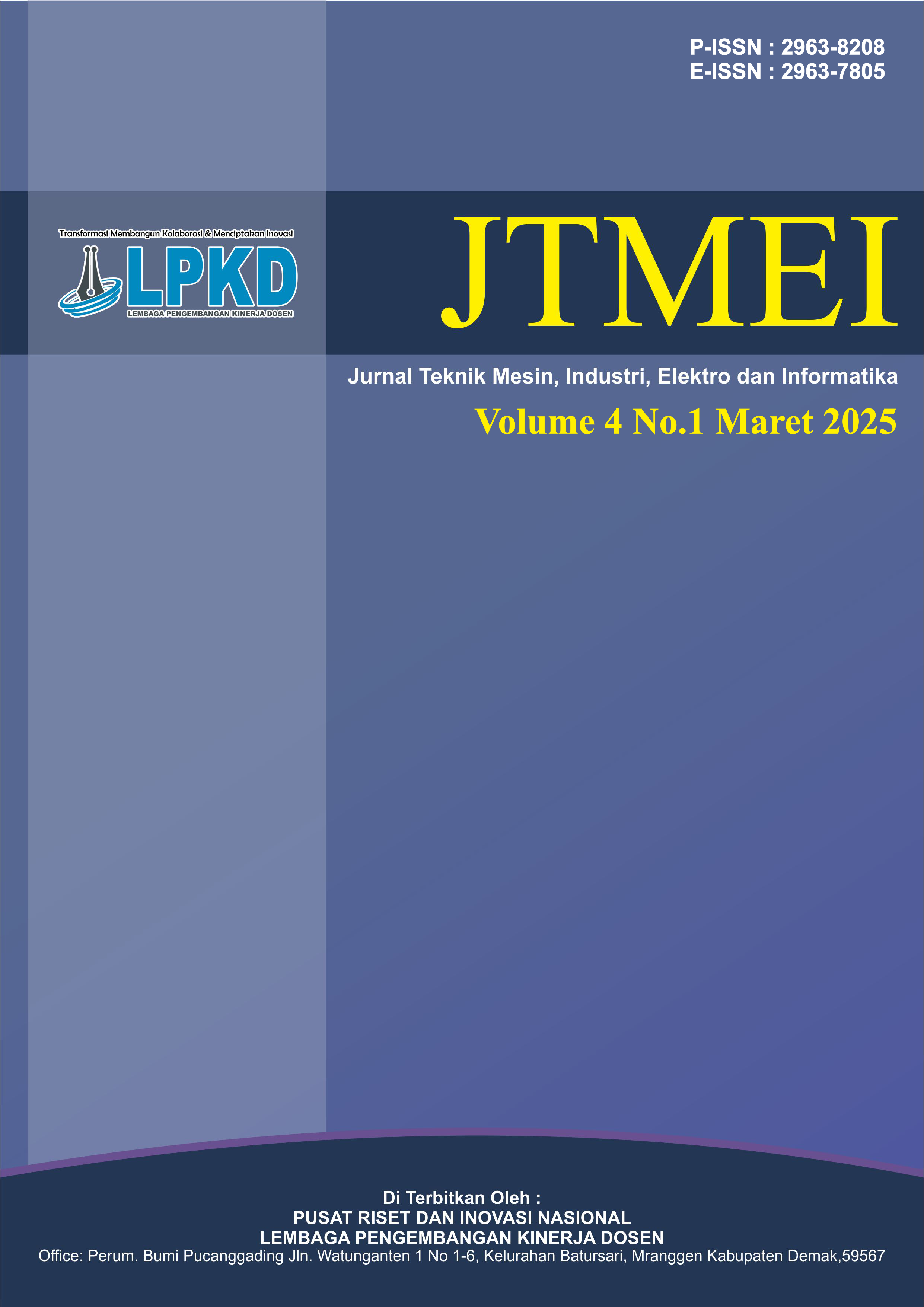Pengaruh Kecepatan Pengaduk Ganda dan Waktu Pengadukan pada Mesin Pencampur terhadap Homogenitas Sampah Organik dalam Proses Pengomposan
DOI:
https://doi.org/10.55606/jtmei.v4i1.4745Keywords:
Composter Machine, Homogeneity, Mixer Speed, Organic Waste, Stirring TimeAbstract
Waste is an unavoidable problem along with increasing population activity due to population growth, which causes the amount of waste to increase, especially from traditional markets, tourist areas, dense settlements, and public facilities. In Malang City, waste in 2023 is estimated to reach 778.34 tons, so proper and environmentally friendly management is needed, one of which is by processing organic waste into a homogeneous compost mixture using a mixing machine. This study aims to analyze the effect of double mixer speed and mixer time on the mixing machine on the homogeneity of organic waste in the composting process. The research method used is quantitative experimental with factorial experimental design (DOE) for the effect of double mixer speed and mixer time on the homogeneity of organic waste in the composting process. The double mixer speed variations tested were 20, 45, and 60 RPM, with mixing times of 20, 30, and 40 minutes. The results showed that the double mixer speed and stirring time had a significant effect on the homogeneity of organic waste in the composting process, with an optimal increase in homogeneity occurring at a speed of 60 RPM and a duration of 40 minutes. Higher speeds accelerate particle distribution, while sufficient mixing time ensures even distribution, thereby increasing the efficiency of microbial decomposition.
Downloads
References
Akbar, M. A., Ahmad, A., & Muria, S. R. (2015). Pengaruh kecepatan pengadukan pada pembuatan bioetanol dari pelepah sawit menggunakan Saccharomyces cerevisiae.
Antu, E. S., & Djamalu, Y. (2019). Desain mesin pencacah sampah organik rumah tangga untuk pembuatan pupuk kompos. Jurnal Teknologi Pertanian Gorontalo (JTPG), 3(2), 57. https://doi.org/10.30869/jtpg.v3i2.247
Ashlihah, Saputri, M. M., & Fauzan, A. (2020). Pelatihan pemanfaatan limbah rumah tangga organik menjadi pupuk kompos. Jumat, 1(1).
Futri, F. A. (2019). Pemantauan homogenitas dekomposisi pupuk kompos menggunakan kamera termal berbasis computer vision.
Miskah, S., Apriani, R., & Miranda, D. (2017). Pengaruh waktu reaksi dan kecepatan pengadukan terhadap konversi biodiesel dari lemak ayam dengan proses transesterifikasi. Jurnal Teknik Kimia, 23(1), 57–66.
Nugraha, N., Pratama, D. S., Sopian, S., & Roberto, N. (2019). Rancang bangun mesin pencacah sampah organik rumah tangga. Rekayasa Hijau: Jurnal Teknologi Ramah Lingkungan, 3(3). https://doi.org/10.26760/jrh.v3i3.3428
Prajitno, D. H., Sholeh, D. R., & Fitriani, B. (2023). Pengaruh jumlah blade dan angle impeller terhadap pola aliran dan homogenitas pada proses pencampuran CaCO3 menggunakan metode Computational Fluid Dynamic.
Rezza, I. M., & Fauzi, A. S. (2023). Rancang bangun alat pencacah sampah organik berkapasitas 25 kg/10 menit. Prosiding SEMNAS INOTEK (Seminar Nasional Inovasi Teknologi), 7(2), 766–771. https://doi.org/10.29407/inotek.v7i2.3495
Sembodo, B. S. T., Noorlyta, A., & Erika Laila, N. M. (2010). Pengaruh kecepatan putar pengaduk proses pemecahan emulsi santan buah kelapa menjadi virgin coconut oil (VCO). EKUILIBRIUM, 9(1), 17–22.
Taufiqurrahman. (2016). Optimalisasi pengolahan sampah berdasarkan timbulan dan karakteristik sampah di Kecamatan Pujon Kabupaten Malang.
Downloads
Published
How to Cite
Issue
Section
License
Copyright (c) 2025 Jurnal Teknik Mesin, Industri, Elektro dan Informatika

This work is licensed under a Creative Commons Attribution-ShareAlike 4.0 International License.








